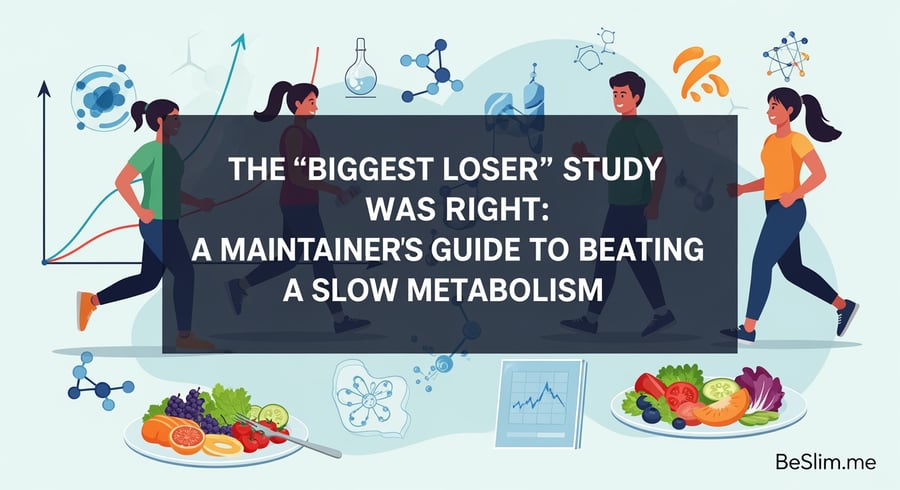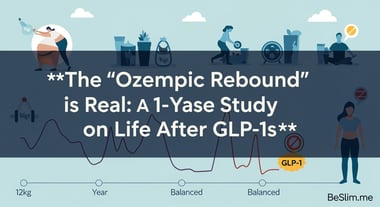Hi, I'm Master Kim, your Empathic Storyteller and Editor at BeSlim.me. I've walked the path of weight loss and maintenance myself, and I know how deeply personal and frustrating it can be. If you've ever felt like your body is fighting against you after shedding pounds—plateaus that won't budge, cravings that hit like a freight train, or that nagging sense that your metabolism has slowed to a crawl—you're not alone. Today, I'm sharing my own story, not as some polished success tale, but as a raw, honest journey through the trenches of weight loss maintenance. We'll dive into the science behind why our bodies resist long-term change, drawing from the infamous "Biggest Loser" study that showed how contestants' metabolisms tanked after rapid weight loss, making regain almost inevitable. But here's the hope: it's beatable with patience, smart strategies, and a focus on your whole self. This guide isn't about quick fixes—it's a how-to for building sustainable habits that honor your body's signals. Let's walk through it together.
Part 1: The Struggle (The 'Before')
I remember the day it hit me hardest. I'd just stepped off the scale after months of grueling effort—diets that left me hangry, workouts that drained every ounce of energy, and a number on the scale that finally budged. I'd lost 50 pounds, and for a fleeting moment, I felt invincible. But then, the maintenance phase began, and it was like my body declared war. The weight started creeping back, no matter how strictly I stuck to my plan. Mornings were a battle against fatigue, afternoons brought insatiable hunger, and by evening, I'd cave to emotional eating just to feel normal again.
This wasn't my first rodeo. Like so many, I'd cycled through fad diets—keto, paleo, juice cleanses—you name it. Each time, the initial drop was exhilarating, but the rebound was crushing. I'd wake up exhausted, my energy levels in the gutter, convinced my metabolism had betrayed me. And science backs this up; studies like the one on "Biggest Loser" participants revealed that after significant weight loss, resting metabolic rates can plummet by hundreds of calories per day, making it feel impossible to keep the weight off without starving yourself. I felt defeated, isolated, and honestly, a bit ashamed. Why couldn't I just "willpower" my way through? The emotional toll was immense—self-doubt crept in, turning every mirror glance into a reminder of failure.
Failed attempts piled up. There was the time I tried extreme calorie restriction, dropping to 1,200 calories a day while hitting the gym twice daily. Sure, the scale moved, but my hair started thinning, my mood swung like a pendulum, and within weeks of "normal" eating, the pounds returned with interest. Another phase involved supplements promising to "rev up" my metabolism—caffeine pills, green tea extracts—but they left me jittery and no closer to balance. I ignored the signs: constant stress from work amplifying my cortisol levels, which I later learned sabotages fat loss by promoting belly fat storage. The psychological struggle was the real killer—feeling like a failure for not maintaining what I'd worked so hard for. It wasn't just about the weight; it was the loss of confidence, the strained relationships from my irritability, and the quiet fear that I'd never escape this cycle.
If this sounds familiar, know that it's not your fault. Our bodies are wired for survival, adapting to weight loss by slowing down to conserve energy. But understanding this was my first step out of the darkness.
Part 2: The Turning Point (The 'Solution')
The shift didn't happen overnight—it rarely does. It started with a moment of raw honesty during a late-night scroll through health forums. I stumbled upon discussions about the "Biggest Loser" study, where researchers tracked contestants years later and found their metabolisms hadn't recovered, leading to easier weight regain. It was a lightbulb moment: my body wasn't broken; it was adapting in ways I needed to work with, not against. That's when I committed to a new approach, one rooted in science but grounded in empathy for my own struggles. At BeSlim.me, we emphasize this holistic view, helping people like me rebuild from the inside out.
First, I dove into understanding leptin resistance. Leptin is that hormone your fat cells produce to signal fullness to your brain, but after rapid weight loss, levels drop, and your body can become resistant, making you feel hungrier even when you've eaten enough. I learned to counter this by incorporating balanced, nutrient-dense meals rather than slashing calories drastically. According to research from the National Institutes of Health, gradual weight loss helps preserve leptin sensitivity and metabolic rate, allowing for more sustainable maintenance. Instead of extreme diets, I focused on whole foods—veggies, lean proteins, healthy fats—that stabilized my energy without the crashes.
Next came cortisol management, the stress hormone that had been my silent saboteur. Chronic stress from over-exercising and life pressures kept my cortisol elevated, which studies show promotes fat storage, especially around the midsection. I integrated mindfulness practices like short daily meditations and gentle walks, which helped lower those levels. A study highlighted by the Mayo Clinic explains how stress reduction techniques can improve cortisol balance and aid weight management, turning what felt like an uphill battle into a manageable path.
Habit formation was the glue that held it all together. I drew from principles in behavioral science, like those from James Clear's work, but tied to real research on neuroplasticity. Small, consistent changes—tracking my meals without obsession, prioritizing sleep to support metabolic recovery—built momentum. The Cleveland Clinic notes that building sustainable habits through gradual changes enhances long-term weight maintenance, emphasizing consistency over perfection. I started with one habit: eating protein at every meal to stabilize blood sugar and reduce cravings. Over time, I added strength training twice a week, not to burn calories aggressively, but to build muscle that naturally boosts metabolism.
This wasn't about gimmicks or overnight miracles. It required effort—journaling my emotions, seeking support from a community like BeSlim.me, and forgiving slip-ups. But by addressing the science head-on—leptin, cortisol, and habits—I began to feel in control, not at war with my body.
Part 3: The Success (The 'After')
Fast forward two years, and the transformation isn't just in the mirror—it's in how I live. I've maintained that 50-pound loss, but more importantly, my energy is steady, my moods are balanced, and food no longer feels like the enemy. Mornings start with purpose, not dread; I enjoy meals mindfully, savoring flavors without guilt. Physically, my metabolism feels revived—I'm not starving to stay at my weight, and activities like hiking with friends are joys, not chores.
The life changes ripple out. Relationships have deepened because I'm present, not preoccupied with scales. Professionally, that sustained energy means I'm more productive, tackling projects with focus I hadn't had in years. Emotionally, the victory is in the resilience: slip-ups happen, but now I bounce back with tools, not self-loathing. It's not perfect—there are still tough days—but the "Biggest Loser" curse? I've beaten it by working smarter, not harder.
This success stems from effort and consistency, proving that slow metabolism isn't a life sentence. It's about nurturing your body back to balance, one empathetic step at a time.
Key Lessons for Your Journey
Prioritize Gradual Changes Over Rapid Loss: Start small to preserve your metabolic rate—aim for 1-2 pounds per week, focusing on nutrient-rich foods to maintain leptin sensitivity.
Manage Stress to Tame Cortisol: Incorporate daily practices like meditation or walks to reduce stress hormones, making weight maintenance feel less like a fight.
Build Habits for the Long Haul: Track one new habit at a time, like adding protein to meals, and celebrate consistency to rewire your brain for lasting success.
If my story resonates, remember: your journey is unique, but you're capable of this. At BeSlim.me, we're here to guide you with personalized, empathetic support—no miracles, just real progress. Let's beat that slow metabolism together.
References
- Gradual weight loss helps preserve leptin sensitivity and metabolic rate - nih.gov
- Stress reduction techniques can improve cortisol balance and aid weight management - mayoclinic.org
- Building sustainable habits through gradual changes enhances long-term weight maintenance - health.clevelandclinic.org
Medical Disclaimer
The content on this website is for informational and educational purposes only. It is not intended as medical advice and should not be relied upon as a substitute for consultations with qualified healthcare professionals who are familiar with your individual medical needs. Always seek the advice of your physician or other qualified healthcare provider with any questions you may have regarding a medical condition. Never disregard professional medical advice or delay in seeking it because of something you have read on this website.




